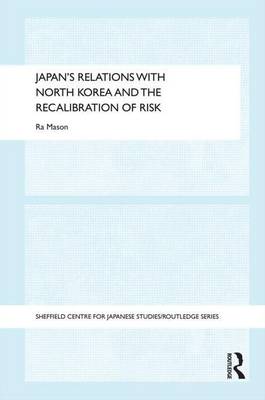The University of Sheffield/Routledge Japanese Studies
3 total works
Japan's Relations with North Korea and the Recalibration of Risk
by Ra Mason
North Korea's contemporary relations with Japan have been fraught with tension. Tactics employed by Pyongyang have included abductions of Japanese citizens, missile launches over Japanese territory, intrusions into Japanese sovereign waters, and nuclear tests in defiance of Japanese and international condemnation. In light of the security risk the DPRK poses, this book examines how the state, market, and society in Japan have framed North Korea as a salient evil, and have in turn constructed and manipulated the risks posed by their neighbour.
Using the example of Japan's post-Cold War responses to North Korea, this book studies the concept of risk in international relations, and its interactive relationship with domestic civil society. It focuses on how security risks are identified and re-evaluated by policy makers, mass media, and civil society stakeholders, and in doing so disentangles the complex processes by which Japan has framed and recalibrated risks in response to the DPRK. By exploring how risks identified with Pyongyang's behaviour towards Japan have been mediated between the state, market, and society via mainstream discourse in Japan, Ra Mason highlights the way in which these processes are causally linked to key actors' conceptions of risk. Indeed, this book provides an original theoretical framework - distinguishing between risk and traditional threat perceptions - through which to address issues of national security and identity, as well as the norms which inform them.
Japan's Relations with North Korea and the Recalibration of Risk will be welcomed by students and scholars across a wide range of fields including Japanese politics, Asia-Pacific studies, international relations, and security studies.
Japan's International Relations
by Glenn D. Hook, Julie Gilson, Christopher Hughes, and Hugo Dobson
The latest edition of this comprehensive and user-friendly textbook provides a single volume resource for all those studying Japan's international relations. It offers a clear and concise introduction to the most important aspects of Japan's role in the globalized economy of the twenty-first century. The book has been fully updated and revised to include comprehensive discussions of contemporary key issues for Japan's IR, including:
- the rise of China;
- reaction to the global economic and financial crisis since 2008;
- Japan's proactive role after 9/11 and the war on terror;
- responses to events on the Korean Peninsula;
- relations with the USA and the Obama administration;
- relations with Russia, Central Asia and the Middle East;
- changing responses to an expanding and deepening European Union.
Extensively illustrated, the text includes statistics, maps, photographs, summaries and suggestions for further reading, making it essential reading for those studying Japanese politics and the international relations of the Asia Pacific.
A note on the cover:
The cover illustration entitled 'Double Standard' is a Japanese manga penned by satirical artist Ichihanahana in November 2010 regarding rising Japanese nationalism, Japan-China tensions over the disputed territory of the Senkaku islands and the US presence in Okinawa. This manga demonstrates many of the key themes in Japan's ties with China and the US, but also a number of other central features of Japan's international relations as explored throughout this text.
Regional Risk and Security in Japan
by Glenn D. Hook, Ra Mason, and Paul O'Shea
Japan's unusual position in the realm of international politics encapsulates a three-fold juxtaposition: both in and out of Asia, both occupied by and a close ally of the United States, and both a key trade partner and a strategic rival of China. Whilst international relations theory offers a number of ways to analyse these relations, this book instead utilizes the concept of risk to provide an innovative perspective on Japan's relations with China, North Korea and the US.
The book elucidates how risk, potential harm and harm are faced disproportionately by certain groups in society. This is demonstrated by providing an empirically rich analysis of the domestic implications of security relations with China, North Korea and the United States through the presence of US troops in Okinawa. Beginning with a theoretical discussion of risk, it goes on to demonstrate how the concept of risk adds value to the study of international relations in three senses. First, the concept helps to break down the boundaries between the international and domestic. Second, the focus on risk and the everyday directs us to ask basic questions about the costs and benefits of a security policy meant to secure the national population. Third, what implications do these two points have for governance? The question is one of governance as Japan's externally oriented security policy produces domestic insecurity shared disproportionately, not equally, as this volume makes clear.
Developing the theory of risk as a tool for understanding international relations, this book will be of great interest to students and scholars of Asian politics, Japanese politics, international relations and security studies, as well as to policy makers and practitioners working in the field.


